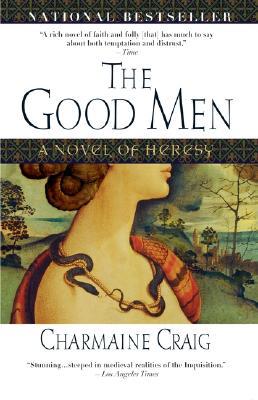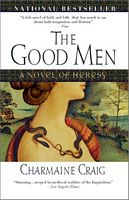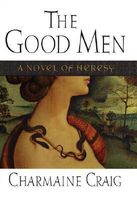- Welcome to FictionDB, Guest
- | My Account
- | Help

The Good Men — Charmaine Craig

In fourteenth-century France, a young woman from the mountain village of Montaillou was tried for heresy by the Catholic inquisition. Her name was Grazida Lizier and, by her own confession, her “joy was shared” with the wrong man: the village rector.
Charmaine Craig was studying medieval history at Harvard when she first encountered the startling testimony of Grazida Lizier, a young woman tried by the Inquisition in 1320. Even after she was accepted into the MFA program at the University of California at Irvine, Craig found she couldn't stop thinking about the seven-hundred-year-old document and knew she had to write a novel based on it. The Good Men is the gripping, epic story of what happened when religious persecution turned Christian against Christian and neighbor against neighbor in Montaillou, a small village in south-west France. Three generations of characters are torn between desires for spiritual grace and fleshly pleasure.
Historically accurate and pitch-perfect, The Good Men movingly dramatizes how relatively small, and at times barely comprehensible, differences in faith served as the impetus behind a tragedy of enormous proportions. Charmaine Craig reanimates questions of religious belief and faith that are as relevant now as in the fourteenth century and, in the process, exposes human nature in all its baseness as well as beauty. This remarkable first novel brilliantly evokes a horrific event in history, with a scope and emotional power that call to mind Victor Hugo's Les Miserables.
The Good Men includes an epigraph that discusses the history on which the novel is based, and other apparatus, including maps, a glossary of heretical terms, and two time lines.
Charmaine Craig was studying medieval history at Harvard when she first encountered the startling testimony of Grazida Lizier, a young woman tried by the Inquisition in 1320. Even after she was accepted into the MFA program at the University of California at Irvine, Craig found she couldn't stop thinking about the seven-hundred-year-old document and knew she had to write a novel based on it. The Good Men is the gripping, epic story of what happened when religious persecution turned Christian against Christian and neighbor against neighbor in Montaillou, a small village in south-west France. Three generations of characters are torn between desires for spiritual grace and fleshly pleasure.
Historically accurate and pitch-perfect, The Good Men movingly dramatizes how relatively small, and at times barely comprehensible, differences in faith served as the impetus behind a tragedy of enormous proportions. Charmaine Craig reanimates questions of religious belief and faith that are as relevant now as in the fourteenth century and, in the process, exposes human nature in all its baseness as well as beauty. This remarkable first novel brilliantly evokes a horrific event in history, with a scope and emotional power that call to mind Victor Hugo's Les Miserables.
The Good Men includes an epigraph that discusses the history on which the novel is based, and other apparatus, including maps, a glossary of heretical terms, and two time lines.
Genres
Sub-Genres
Click on any of the links above to see more books like this one.


